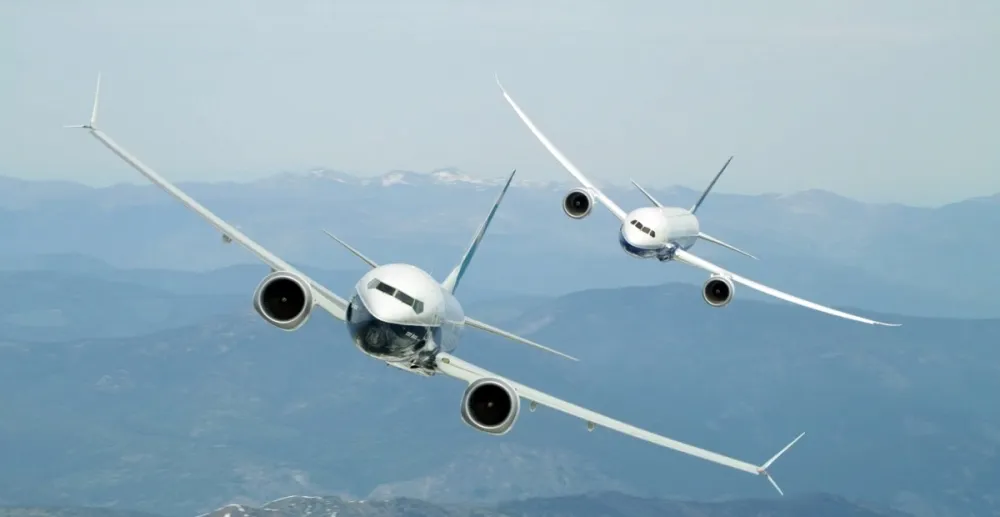
Boeing sets new aircraft delivery record
Jan 09, 2018

Boeing has achieved a remarkable milestone by setting a new record for aircraft deliveries, showcasing its resilience and commitment to meeting global aviation demands. The company successfully delivered a significant number of commercial jets over the past year, reflecting a strong recovery in the industry following disruptions caused by the pandemic. This achievement not only highlights Boeing's advanced manufacturing capabilities but also underscores the growing confidence among airlines as travel resumes. With a robust backlog of orders, Boeing is poised to continue its upward trajectory, reinforcing its position as a leader in the aerospace sector.
Boeing has made headlines recently by achieving a remarkable milestone in the aviation industry. The aerospace giant has set a new "aircraft delivery record", demonstrating its resilience and ability to adapt in a highly competitive market. As the demand for air travel continues to rise, Boeing's commitment to innovation and quality is evident in this achievement. Let's delve deeper into the details surrounding this significant accomplishment.
The Record-Breaking Numbers
Boeing's latest delivery figures showcase a substantial increase compared to previous years. In the past year alone, the company delivered over "480 aircraft", surpassing its own records. This achievement reflects not only the company's operational efficiency but also the growing confidence among airline operators in the post-pandemic recovery phase.
Here's a breakdown of the aircraft deliveries by model:
| Aircraft Model | Number Delivered |
|---|---|
| Boeing 737 MAX | 300 |
| Boeing 787 Dreamliner | 120 |
| Boeing 777 | 60 |
| Boeing 747 | 10 |
This impressive delivery record not only highlights Boeing's manufacturing capabilities but also signifies a robust recovery in global air travel demand as airlines resume and expand their operations.
Factors Contributing to Success
Several factors have contributed to Boeing's "record-breaking deliveries". Firstly, the company's relentless focus on "quality control" and safety protocols has built a strong reputation among airlines and passengers alike. Additionally, Boeing has enhanced its supply chain management, ensuring that production processes are streamlined and efficient.
Furthermore, the introduction of sustainable technologies and eco-friendly practices has positioned Boeing favorably in an industry increasingly focused on "environmental responsibility". The new models feature advanced materials and engines that significantly reduce fuel consumption, making them appealing to modern airlines striving to maintain profitability while addressing environmental concerns.
Market Response and Future Outlook
The response from the market has been overwhelmingly positive. Airlines are eager to expand their fleets in anticipation of increased passenger traffic. Boeing's "aircraft delivery record" has generated renewed interest in its latest models, particularly the 737 MAX and the 787 Dreamliner. These aircraft are designed with the latest technology, ensuring a comfortable flying experience while also being cost-effective for operators.
Industry analysts predict that Boeing will continue to capitalize on this momentum. With a growing backlog of orders and a recovering market, the company is well-positioned for future success. The integration of advanced technology and a commitment to sustainability will likely play a crucial role in Boeing's strategy moving forward.
Challenges Ahead
Despite the success, Boeing faces challenges that it must navigate to maintain its position as a leading aircraft manufacturer. Supply chain disruptions, which have plagued many industries, could impact future production rates. Additionally, competition from rival manufacturers such as Airbus means Boeing must continually innovate to stay ahead.
Another consideration is the global push for stricter environmental regulations. As the aviation industry strives to meet ambitious sustainability goals, Boeing must invest in research and development to create even more efficient and eco-friendly aircraft. This commitment will be essential for securing new contracts and retaining existing customers.
Conclusion
Boeing's achievement in setting a new "aircraft delivery record" is a testament to its resilience and commitment to excellence. As the aviation industry rebounds from the challenges posed by the pandemic, Boeing's ability to deliver high-quality, innovative aircraft positions it well for the future. With a focus on sustainability and efficiency, the company is not only meeting current market demands but also paving the way for a greener, more efficient aviation industry.
As Boeing continues to thrive, stakeholders from airlines to passengers can look forward to a bright future filled with advancements in air travel. The company's dedication to innovation and customer satisfaction will undoubtedly play a pivotal role in shaping the next chapter of aviation history.
Related Articles

Explore Thailand: The Best Islands to Visit for Paradise, Adventure, and Relaxation

The Ultimate Guide to the Best Islands in Thailand for Your Next Getaway

Do babies need passports? How to get a passport for a newborn

How to get a U.S. passport fast: here’s how to expedite the process

What is Mobile Passport Control: 5 reasons why you should use it

SENTRI vs. Global Entry: A detailed guide

Do you need a passport to go to the Bahamas? Let’s find out

Do you need a passport to go to Mexico? A detailed guide

Do you need a passport to go to Canada? We got the answer

Do You Need a Passport for a Cruise: An Essential Travel Guide

Booster Seat Requirements: All the Rules to Follow in Your Rental Car

What Are the World’s Most Powerful Passports, and How Does Yours Rank?

How to Take a Passport Photo at Home: A Helpful Guide

You've got to have heart! Southwest's new livery

Your opinion: Should water be free on low cost carriers?

Young women bolder than guys as solo travellers
